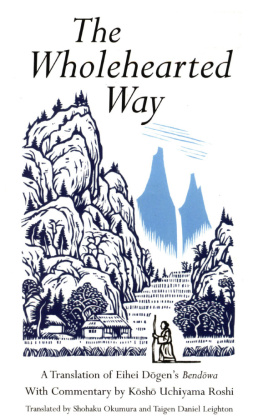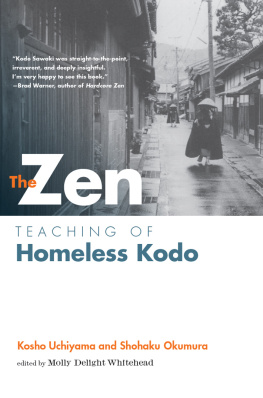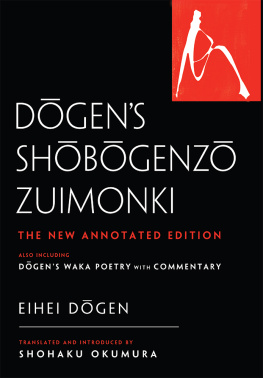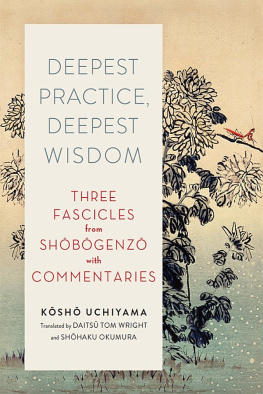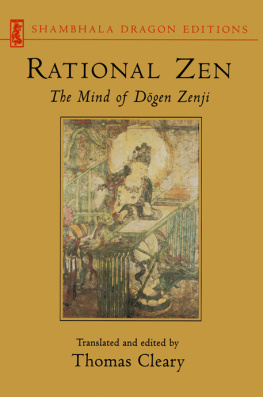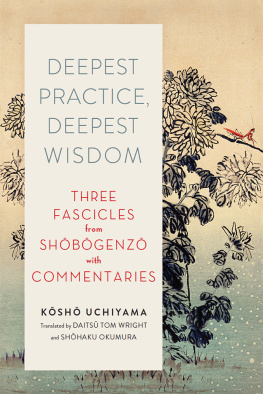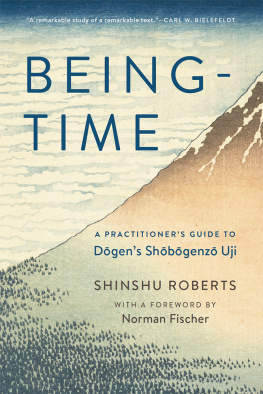This is a book that should grace the shelves of any practitioner, not only because of Dogens classic text but also for the unequivocal way in which the commentary amplifies the text and makes the very important point that a Buddhist practice, if it is to mean anything, must touch every area of life and not just the confines of the meditation cushion.
The Middle Way
I am glad to see Uchiyama Roshis classic commentary to Instructions for the Zen Cook back in print. Dogens original text (here in Thomas Wrights lucid translation) is particularly applicable to everyday spirituality in the world, and Roshis commentary, full of gritty, funny stories about his early days as a monk in pre- and post-war Japan, and charming tales from Buddhist and Japanese folklore, evidence a plain-speaking, shoot-from-the hip approach to Zen that is as refreshing now (possibly more so!) as it was when the book first came out. Zen masters of this full-bodied tasty vintage are hard to find these days!
Zoketsu Norman Fischer, author of Taking Our Places: The Buddhist Path to Truly Growing Up
ABOUT THE BOOK
In the thirteenth century, Zen master Dgenperhaps the most significant of all Japanese philosophers, and the founder of the Japanese Soto Zen sectwrote a practical manual of Instructions for the Zen Cook. In drawing parallels between preparing meals for the Zen monastery and spiritual training, he reveals far more than simply the rules and manners of the Zen kitchen; he teaches us how to cook, or refine our lives, In this volume Ksh Uchiyama Rshi undertakes the task of elucidating Dgens text for the benefit of modern-day readers of Zen. Taken together, his translation and commentary truly constitute a cookbook for life, one that shows us how to live with an unbiased mind in the midst of our workaday world.
DGEN (12001253) is known as the founder of the Japanese Soto Zen sect.
Sign up to learn more about our books and receive special offers from Shambhala Publications.

Or visit us online to sign up at shambhala.com/eshambhala.
HOW TO COOK YOUR LIFE
From the Zen Kitchen to Enlightenment

ZEN MASTER DGEN AND KSH UCHIYAMA RSHI
Translated by Thomas Wright

SHAMBHALA
Bostan & London
2013
This volume contains translations of Zen Master Dgens Tenzo Kykun (Instructions for the Zen Cook), as it appears in the Eitheigen Zenji Shingi, an official compilation of Dgens works by Reiy End, and of Ksh Uchiyama Rshis Jinsei Ryri no Hon (How to Cook Your Life), published by the St-sh in 1956 and 1970 respectively.
Shambhala Publications, Inc.
Horticultural Hall
300 Massachusetts Avenue
Boston, Massachusetts 02115
www.shambhala.com
Protected by copyright under the terms of the International Copyright Union.
All rights reserved. No part of this book may be reproduced in any form or by any means, electronic or mechanical, including photocopying, recording, or by any information storage and retrieval system, without permission in writing from the publisher.
Library of Congress Cataloging-in-Publication Data
How to cook your life: from the Zen kitchen to enlightenment/by Dgen and Ksh Uchiyama Roshi; translated by Thomas Wright.
p. cm
Originally published: New York: Weatherhill, 1983.
Contents: Instructions for the Zen cook Tenzo kykun/DgenHow to cook your life Jinsei ryri no hon/Ksh Uchiyama.
eISBN 978-0-8348-2432-4
ISBN 978-1-59030-291-0 (pbk.: alk. paper)
1. Dgen, 12001253. Tenzo kykun. 2. Spiritual lifeZen Buddhism. 3. CookeryReligious aspectsZen Buddhism. 4. Monastic and religious life (Zen Buddhism) I. Wright, Thomas. II. Dgen, 12001253. Tenzo kykun. English. 2005. III. Uchiyama, Ksh, 1912 Jinsei ryri no hon. English. 2005. IV. Title: Tenzo kykun. V. Title: ryri no hon.
BQ9449.D654.T4685 2005
294.3444dc22
2005048964
Contents
Publishers Note
This book contains diacritics and special characters. If you encounter difficulty displaying these characters, please set your e-reader device to publisher defaults (if available) or to an alternate font.
T he following text of the Tenzo Kykun, or as I have entitled it in English, Instructions for the Zen Cook, was written over a period of years by Eihei Dgen Zenji (12001253), who was intimately familiar with both the Rinzai and St schools of Zen, and finally completed in 1237. More specifically, it was written for Dgens immediate disciples living with him in a monastery in medieval Japan. Now what possible connection could a text written for a group of monks some 750 years ago have for present-day Europeans and Americans neither living in a monastery nor particularly familiar with a society or way of looking at life which differs totally from our modern Western societies? That is the question to which Ksh Uchiyama Rshi addressed himself when he began writing the commentary that accompanies Dgens text.
The answer to that question, of course, depends upon the universal nature of the subject that is being addressed. In other words, such a text will have no relevancy at all if the problems that Dgen deals with concern only a small group of male Buddhist practitioners of Kamakura-period Japan (11851336). I have personally found that not to be the case, especially thanks to my teacher Uchiyama Rshi who, I believe, succeeded in pulling out those portions of the text that upon first glance seem very esotericperhaps bewildering is a better wordand discussed the significance such passages had for him as a twentieth-century disciple of Dgen.
As a translator, the original text and Uchiyama Rshis commentary presented entirely different problems. At times Dgen Zenjis writings, just as classical literature, border on the impenetrable even for the present-day Japanese reader; much more so will they appear that way for a long time to a person not born in Japan nor educated from childhood to read Chinese characters. More that that, however, Dgens logic is a big problem for Western readers, not to mention translators. If readers familiar with previous translations of Dgen were to compare versions of the same writing, they would be startled to find a copious variety of interpretations for the same passage. One reason for this is that different translators will naturally express themselves differently. Yet another, deeper reason is that a translator, though familiar with the language, may be unaware of the reality behind the words.
Here is where years of practice come in. For me, to translate any work of Dgens without basing my daily life upon his most fundamental teaching, that is jijuy-zammai, or zazen, would be meaningless. Unless the posture of ones life addresses the same questions Dgen Zenji addressed, there is little hope that the translation will be much more than a technically correct but totally incomprehensible work.
The difficulty for me over the years in regard to Dgens logic has been how to understand the route Dgen took from his proposition to his conclusion. Though I might have been able to follow the development of his thought. it always seemed that somewhere along the line he made a twist or bend that did not fit into the expected route of the logic of my mind. For a long time I thought that this was mostly due to the fact that Dgen was Japanese and I am American, and that that was the way Japanese people in those days thought. More and more, however, I have come to seen the arrogance of such thinking, and that the problem lay not with Dgens logic, but rather with the expectations I brought to the text. Besides that, it was not logic per se that Dgen took up as his life work, but rather the very nature and complexities of the reality of our life and death.
Next page


